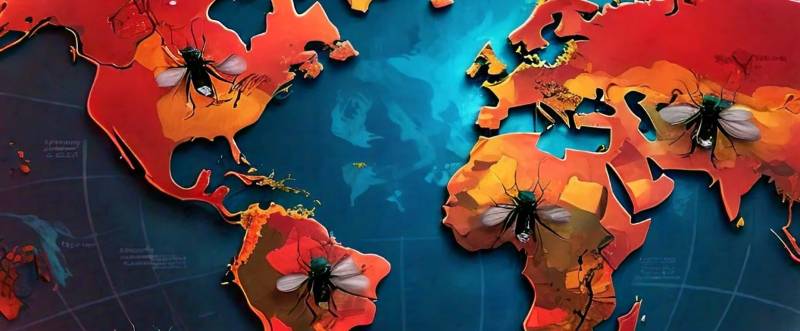In a world where nearly half the population is at risk of dengue, a mosquito-borne flavivirus disease, predicting outbreaks is crucial for public health and economic stability. A new study has uncovered a surprising connection between sea surface temperature anomalies in the Indian Ocean and the magnitude of global dengue epidemics, offering hope for more effective forecasting and outbreak response planning.
The study, conducted by Yuyang Chen and colleagues, used climate-driven mechanistic models and data on dengue cases reported from 46 countries in Southeast Asia and America to model associations between global climate patterns and the seasonal and interannual magnitude of dengue epidemics. The researchers discovered that the Indian Ocean basin-wide (IOBW) index – the regional average of sea surface temperature anomalies in the tropical Indian Ocean – is closely associated with dengue epidemics for both the Northern and Southern Hemispheres.
A Three-Month Window for Prediction
According to the findings, the IOBW index in the three months before the dengue season is a crucial factor in predicting the disease magnitude and timing of dengue outbreaks per year in each hemisphere. The ability of IOBW to predict dengue incidence likely arises due to its effect on regional temperatures.
Current dengue early warning systems use climate indicators, like precipitation and temperature, to forecast disease trends. For example, El Niño climate events are known to influence the dynamics of dengue transmission globally by affecting mosquito breeding. However, the long-distance climate drivers on dengue outbreaks are poorly understood.
Cautious Optimism and the Need for Further Validation
While the authors argue that the findings could allow for more effective planning for outbreak response, they caution that further assessments are needed to evaluate the predictive performance of the model. “Although our model demonstrates its capability to capture observed patterns, making premature claims about its predictive ability without rigorous validation of future data would be unjustified,” Chen et al. write.
With no specific drugs or vaccines currently available for dengue, the ability to predict the risk of outbreaks and prepare accordingly is vital for many regions where the disease is endemic. The study’s findings suggest that the IOBW index could enhance the forecasting and planning for outbreak responses, but more research is needed to validate the model’s predictive power.
As climate change continues to affect global weather patterns, understanding the complex relationships between climate indicators and disease outbreaks becomes increasingly important. The Indian Ocean temperature anomalies may hold a key piece of the puzzle in predicting and preparing for dengue epidemics, offering a glimmer of hope in the fight against this widespread and devastating disease.


